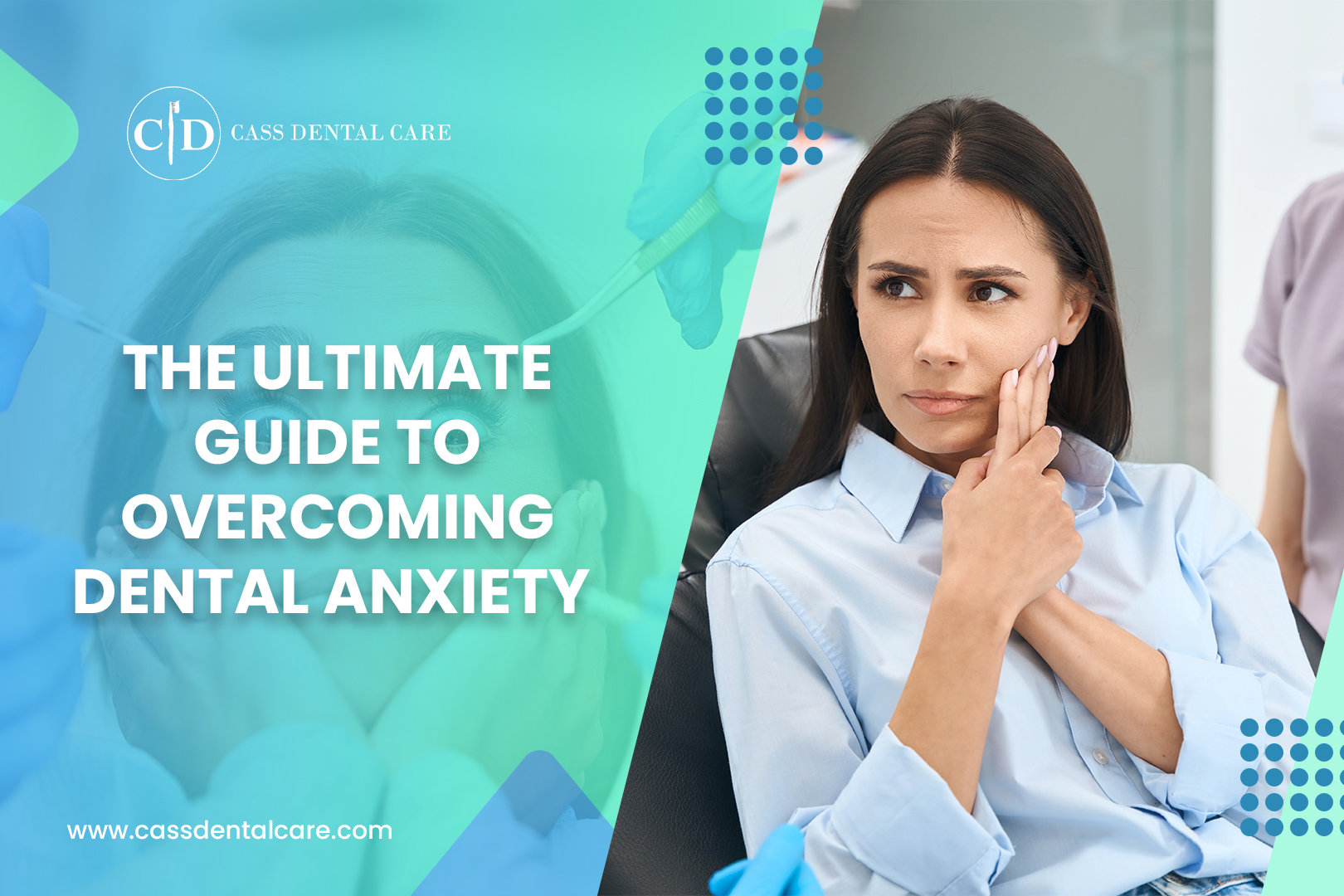A lot of people have dental anxiety, which makes going to the dentist for regular checks and treatments hard. But getting over dental anxiety is essential for keeping your teeth healthy and stopping problems from worsening because you put off treatment. If you’re afraid of the dentist, getting the help and advice you need to face your fears is essential.
This ultimate guide will give you helpful advice and proven methods to help you overcome your fear of the dentist and enjoy your visits without stress. We will discuss why people get anxious about the dentist, what causes dental anxiety, how to deal with it, and how open conversation with your dentist can help you relax.
If you follow these guides, going to the dentist will be more accessible, and your overall mouth health will improve. Stay tuned as we show you how to quickly overcome your fear of the dentist and keep your smile healthy and happy.
It is crucial to figure out what is making you anxious
The dentist is not out to hurt you; they’re there to help. Before you go to the dentist, try to overcome your fear of pain and remember that their job is to improve your mouth health.
Going to the dentist is stressful for a lot of people. This is because visiting the doctor makes us think of pain and discomfort. However, improved tools and methods have made the dentist much more bearable for patients.
We also know that some people might be scared of needles. In this case, your dentist can give you shots that will numb the area to make the process more easy. Dentists work hard to ensure patients aren’t in too much pain or discomfort during treatments. You can let them know if you are feeling any pain or worry.
Some people might be worried that the anesthesia won’t be strong enough to keep them comfy during the dentist appointment. It’s normal for people to worry about this, so dentists make sure their patients are as relaxed as possible. People who have had oral fear in the past shouldn’t be afraid to talk to their doctor about it.
Why do people get dental anxiety?
Worry, fear, and phobias: Even if they’re just in your head, things that happen, how you feel, or what you’ve been through can make them happen, even if has nothing to do with going to the dentist.
Because you are unique, you bring your past to the doctor. This past shapes how you think and feel, and it can significantly affect your experience no matter what doctor you go to. You can deal with your worries and fears better if you know what makes them happen.
Dental fear can be caused by
1. Bad Experiences
When you think about dental anxiety, think about things that happened in the past. To make someone fear something, it doesn’t have to be their dentist’s visit. In this case, it could be seeing a scary movie as a child or another movie with a scary doctor. This point of view might change how you see things and make you very nervous before going to the doctor.
2. Feelings like you can’t handle things
A few say they can’t let go of power at the dentist’s office. Because of your feelings, you might be unable to control yourself and refuse to let the doctor take over.
3. Anxiety about anesthetics and its effects
Some harmful effects can happen when you use local anesthetics, also called nerve blocks. Some feel dizzy, sick, sleepy, or weak after taking local anesthetics. Others have tongue swelling, pain in the ears, neck, joints, or muscles, and a lot of drooling.
4. Lack of trust
Most people spend little time at the dentist’s office. Setting up a trusted relationship with someone you just met is hard. Going to the doctor could be worse if you move around a lot or have had bad experiences with them.
5. Other fears or health problems
Fear of the doctor could be a sign of another fear. It could be any kind of fear or disorder, like agoraphobia, claustrophobia, generalized anxiety disorder, or obsessive-compulsive disorder. There’s a chance that any issue with your mouth or teeth that makes you unhappy at the dentist is to blame.
6. Afraid of getting shots
Even worse is the worry that the local numbing shots won’t work or won’t work right away. People fear that they will feel the full pain of the process if this happens.
7. Being afraid of what tooth sounds mean
Many things happen when you get a dental check or treatment done. Some of these, like the sound of a drill, make some people tense and scared.
8. The pain of having someone come into your personal space
Many people need to learn more about this subject, even after going through it themselves. Some people have trouble with personal space and find that people who aren’t in their accepted groups invade theirs.
Tips on How to Get Rid of Dental Anxiety
Tip 1: Pick a Good Dentist
Finding a dentist who is skilled and understanding in dealing with nervous people is one of the best ways to deal with dental anxiety. A good dentist for someone afraid of the dentist is skilled at both oral treatments and making the office a calm and safe place.
When looking for a dentist, here are some things to think about:
- Find out what others think: Friends and family who know how anxious you are can often suggest dentists known for being polite and good at communicating with patients.
- Research on the Web: Look for doctors who offer services for people who are afraid of or have oral anxiety. Many dentist offices now know how important it is to help nervous people.
- First Consultation: Set up a time to meet or talk with the doctor before you schedule any work. This visit can be used to find out how comfortable people are, talk about worries, and get to know each other.
- Talk to your dentist: The right dentist will listen to your worries and work with you to ease them. They should be willing to talk about the Tips and answer any questions to help make the experience less scary.
Getting dental care can be much less stressful if you find a dentist who understands and respects your fear. It builds trust and safety, two crucial things to do if you’re afraid of the dentist.
Tip 2: Communicate
Talking to your doctor is one of the most important things you can do to deal with dental anxiety.
Being honest with your dentist about your worries and fears is essential. This helps the dentist understand what’s happening and lets them change how they treat you to fit your needs.
Here are some concerns to think about when communicating:
- Say what’s bothering you: Tell the truth about how anxious you are. Telling your dentist about these things can help them change how they do things, whether it’s a specific part of the process or general nervousness.
- Set up a signal to stop: You can tell your doctor you need a break during treatment by raising your hand. You can feel in charge and safe knowing you can control the process anytime.
- Find out more: Knowing what to expect can make you feel less anxious. Feel free to ask your dentist to describe the Tips they will take or the tools they will use.
Tip 3: Techniques for Distraction
Distractions can help a lot when you’re scared of the dentist. Taking your mind off the process can help you feel less stressed and more comfortable. Think about these ways to entertain yourself:
- Pick up a book or listen to music. Remember to bring headphones. You can listen to your favorite podcasts, music, or books. This takes your mind off of things and blocks out the sounds of the dentist’s office.
- Attention to Breathing: Deep, slow breaths will help you focus on breathing. For some people, this can help them stay calm.
- Distractions in sight: In some dentist offices, TVs or pictures are on the roof. Keeping your attention on these things during treatment can help pass the time.
Tip 4: Learn How to Relax
Relaxation methods can help you feel less anxious about visiting the dentist before and after your appointment. These techniques are meant to calm the body and mind, which can help with worry and fear:
- Relaxation exercises with a guide: You should use guided relaxing or meditation apps before your meeting. If you want to feel calm, these techniques can help.
- Being mindful: Being mindful means paying attention to the present time and your surroundings. This might help take your mind off of your stress.
- How to Do Deep Breathing: Do activities that help you breathe deeply, like diaphragmatic breathing or the 4-7-8 method. You can slow down your heart rate and loosen up your muscles by doing these things.
These tips can help you deal with dental fears during dentist visits. Remember that the most important thing is to find what works best for you and let your doctor know what you need.
Tip 5: Exposure and Practice Visits Over Time
Gradual contact is a method that is often used to get over fears, such as dentist nervousness. The patient is slowly and gradually brought into the dentist’s office in a safe way that doesn’t scare them. This is how to proceed:
- Start with a leisurely visit: First, go to the dentist’s office to meet the doctor and staff; wait to get any work done. This could help you get to know the people and the place.
- Watch a Non-Invasive Procedure: Watch a regular cleaning or other non-invasive procedure done on someone else to understand the process better.
- Plan a minor procedure: Schedule a small treatment, like a tooth cleaning, once you feel better. This Tip makes people feel good about the dentist team and trust them.
- Move to Difficulty Procedure: As your comfort level rises, move on to more complicated processes.
How Cass Dental Care can help you deal with your dental anxiety
Dentistry at Cass Dental Care has many tools and services to help you feel less anxious and more at ease during your visit. We’re always ready to talk about your nervousness and come up with a set of solutions that will help you feel better.
If you’re worried about getting dental care because of dental anxiety, talk to us at dentists in Darien. We’ll help you develop a treatment plan to help you feel better while you get the care you need.





